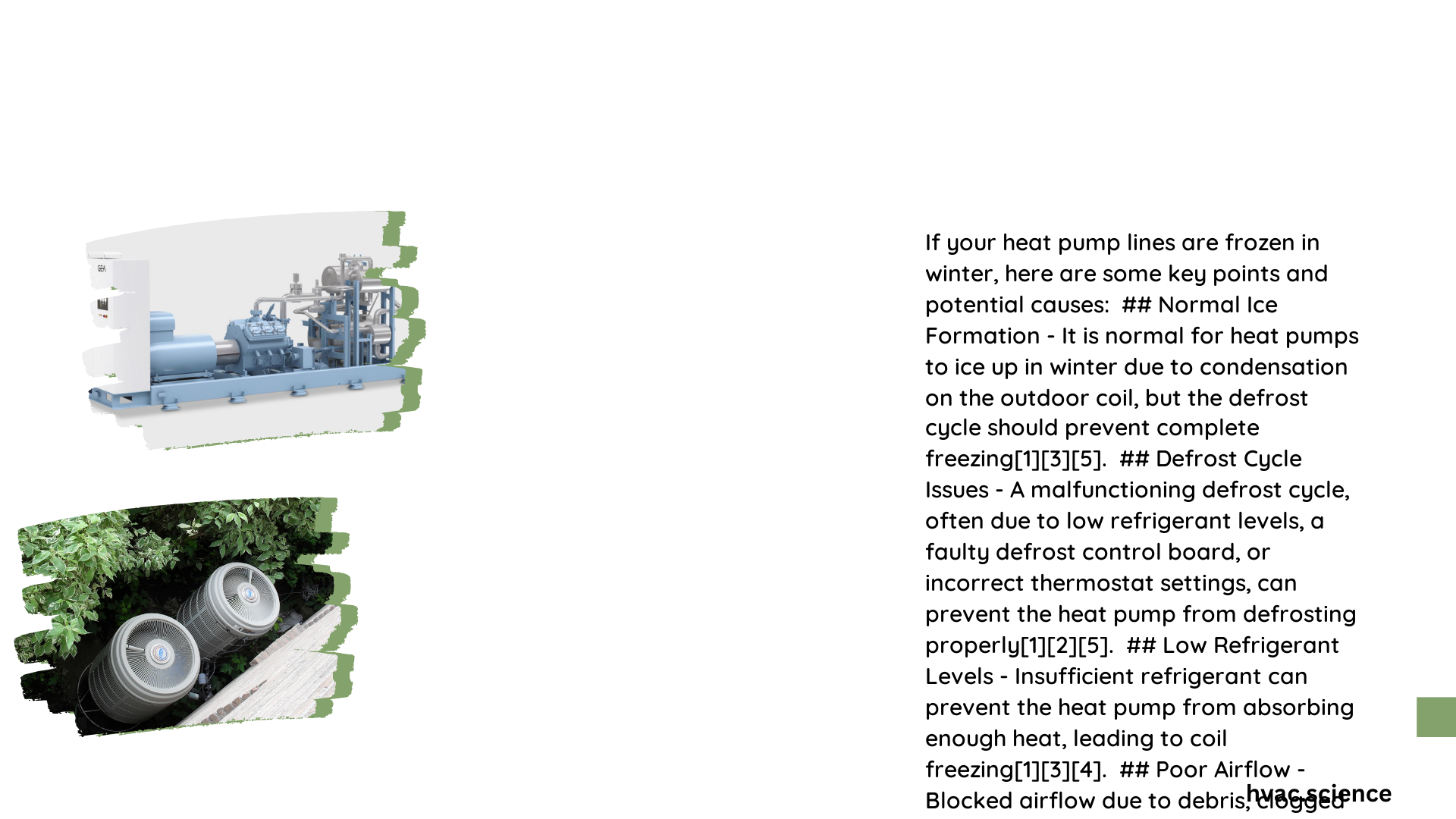Heat pump lines freezing in winter is a common issue that can significantly impact the efficiency and functionality of your heating system. This problem occurs when moisture accumulates and freezes on the refrigerant lines or coils, preventing proper heat transfer. Understanding the causes, effects, and solutions to this issue is crucial for maintaining a comfortable home environment during cold months and preventing costly repairs.
What Causes Heat Pump Lines to Freeze in Winter?
Several factors can contribute to heat pump lines freezing during winter:
- Low Refrigerant Levels: Leaks in the system can lead to insufficient refrigerant, compromising the heat pump’s ability to absorb and transfer heat.
- Clogged Air Filters: Restricted airflow due to dirty filters can cause the system to freeze up.
- Dirty Evaporator Coils: Filthy coils impair heat transfer, leading to freezing.
- Malfunctioning Blower Motor: A faulty motor can reduce airflow, causing moisture buildup and freezing.
- Reversing Valve Issues: A stuck or malfunctioning valve prevents proper mode switching.
- Environmental Conditions: Freezing temperatures, gutter runoff, or an uneven concrete slab can contribute to ice buildup.
What Are the Effects of Frozen Heat Pump Lines?

Frozen heat pump lines can have several negative consequences:
- Reduced efficiency and higher energy bills
- Potential system damage, including compressor failure
- Complete system breakdown requiring costly repairs or replacement
How Can You Prevent Heat Pump Line Freezing?
Preventing heat pump line freezing involves several proactive measures:
- Regular Maintenance: Clean air filters, evaporator coils, and check blower motor function regularly.
- Proper Insulation: Ensure refrigerant lines are adequately insulated against cold temperatures.
- Correct Installation: Install the heat pump on a level surface away from gutter runoff.
- Clear Airflow: Keep all vents and ducts free from obstructions.
- Professional Inspections: Schedule regular check-ups with a qualified HVAC technician.
What Steps Should You Take to Thaw Frozen Heat Pump Lines?
If you discover your heat pump lines are frozen, follow these steps:
- Turn off the system immediately to prevent further damage.
- Switch the thermostat to fan mode to circulate warm air (if indoor coil is frozen).
- Check for and remove any obstructions in filters, vents, and ducts.
- Gently pour warm (not hot) water over frozen coils to melt ice.
- Wait for the defrost cycle to complete if the outdoor unit is affected.
- If the problem persists, contact a professional HVAC technician.
What Should Be Included in a Winter Heat Pump Maintenance Checklist?
A comprehensive winter maintenance checklist should include:
| Frequency | Task |
|---|---|
| Monthly | Check and clean air filters |
| Every 3-6 Months | Inspect and clean evaporator coils |
| Seasonally | Full system inspection and maintenance |
Additional items to monitor:
– Refrigerant levels
– Airflow through vents and ducts
– Thermostat function
– Ice buildup on coils and lines
– Gutter runoff direction
– Heat pump leveling
How Often Should You Inspect Your Heat Pump in Winter?
Regular inspections are crucial for preventing frozen heat pump lines:
- Monthly: Check and clean air filters
- Quarterly: Inspect evaporator coils and overall system performance
- Annually: Schedule a professional maintenance check before the winter season
What Are Common Challenges in Preventing Heat Pump Line Freezing?
Several challenges can complicate heat pump maintenance in winter:
- Persistent Ice Buildup: Regular checks for ice accumulation are necessary, especially during freezing temperatures.
- Gutter Management: Ensure gutters are clear and not directing water onto the heat pump.
- Unit Leveling: Regularly check that the heat pump remains level to prevent drainage issues and ice buildup.
- Refrigerant Leaks: These can be difficult to detect without professional equipment.
- Extreme Weather: Severe cold snaps can overwhelm even well-maintained systems.
How Can You Improve Heat Pump Efficiency in Winter?
To enhance your heat pump’s performance during cold months:
- Optimize Thermostat Settings: Use programmable thermostats to maintain consistent temperatures.
- Supplement with Zone Heating: Use space heaters in less-used areas to reduce strain on the main system.
- Improve Home Insulation: Reduce heat loss through walls, windows, and doors.
- Regular Professional Tune-ups: Schedule annual maintenance with a qualified technician.
- Monitor System Performance: Keep track of energy bills and system efficiency to catch issues early.
By understanding the causes of heat pump line freezing and implementing preventive measures, you can ensure your heating system operates efficiently throughout the winter months. Regular maintenance and prompt attention to any issues will help avoid costly repairs and maintain a comfortable home environment.
References:
1. Angi: Heat Pump Freezing Up? How to Solve
2. Comfortable Design Inc.: Why Is My Heat Pump Freezing Up?
3. Healthy Home Heating and Cooling: Why Your Heat Pump Freezes up and What to Do
